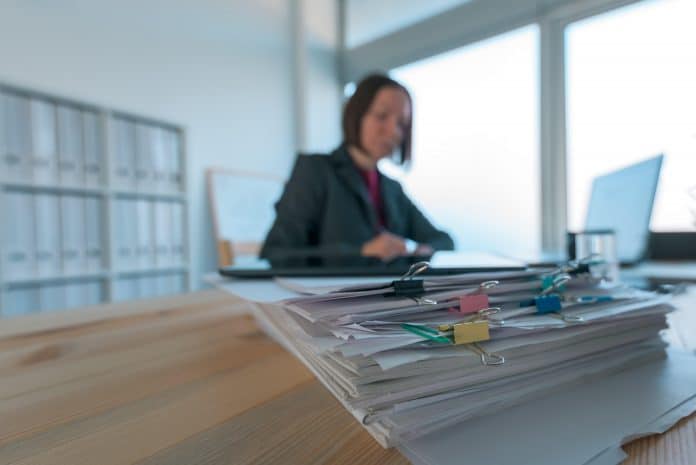Lizzie Grant, Professional Organiser at Simply Stuff Ltd. in collaboration with Yell.Com, offers 10 tips on workplace organisation
- Have a “clean desk policy” so that every employee has to clear their workspace and keep it free from clutter and paperwork at the end of each day. This makes decluttering an ongoing process and is particularly helpful where employees are hot desking.
- Consider the positives and negative aspects of your current filing system, both physical and digital and train your employees on how to use these systems so that everyone is aware of what they need to do. It is worth investing time to create better ways of working together efficiently as this will decrease stress levels and increase overall wellbeing and productivity.
- Avoid clutter building up through the day by spending a few minutes clearing your desk at either the start of the day or at the end of the day (whenever you have more time). During the day, try to have a quick clear-up of your desk before starting a new piece of work as this will clear your head as well as your space.
- Clutter is generally caused by not having “homes” for items. Think about what you actually need out on your desk (i.e. the items you use very regularly) and then dedicate space in drawers or cupboards for items that are not used as much. Every item should have a place where you can put it away. This means you are more likely to find them when you need them and makes tidying up much quicker.
- Go digital – paperwork is one of the most common causes of workplace clutter. Old documents, reports, magazines, training notes, receipts etc. Use a scanner or a phone app to scan documents and save them digitally so that you can discard the hard copies.
- Always have a rubbish bin within arm’s reach of your desk (preferably under it) so you can get rid of rubbish quickly and easily. You could have one rubbish bin for confidential paperwork that needs to be shredded and another bin for general rubbish, but just make sure if you have cleaners that they know which is which to avoid any breaches of confidentiality.
- Messy work colleague? We all have different tolerance levels when it comes to clutter. Often when we clean our own spaces and others can see the benefits, this spurs them on to do the same but not always! In this case, honesty is generally the best policy and speaking to your colleague about how it is making you feel (in a friendly and non-confrontational way) and offering to help them declutter can solve the problem.
- Relocating employees regularly provides a great opportunity to keep on top of their clutter. Give them one large box to move their stuff and this will help focus their mind on what they really need to bring with them and what is not actually needed.
- If general office clutter is becoming a problem, encourage everyone to have a “decluttering” morning or afternoon. You could perhaps bring in breakfast or lunch for employees, allow everyone to wear casual clothes and put on some music to make it a bit more fun and incentivise everyone to get on board.
- Try and encourage a culture of respect for the working environment. It may even be helpful to draw up rules for the kitchen / bathroom areas with everyone’s input (or input from separate teams that use these areas) to ensure that everyone is on the same page. Using small incentives or prizes for uncluttered and tidy areas might also be a positive way to keep everyone focused on keeping their workspaces clear and uncluttered.


